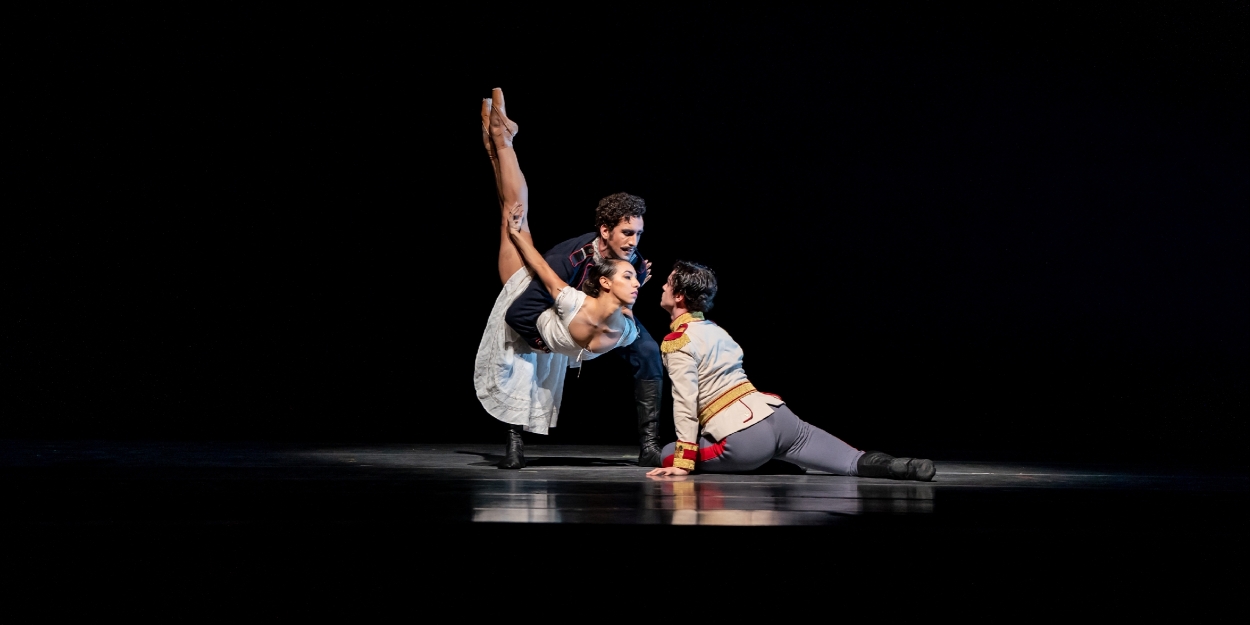Review: THE JOFFREY BALLET: ANNA KARENINA at Kennedy Center
Stellar production of the Russian classic

How do you fit an 800-page Russian classic into a night's ballet? Throw a lot of ballroom dances.
There has been a couple of attempts to make Leo Tolstoy's "Anna Karenina" into a ballet before - there also has been two operas and nearly two dozen filmed versions. Past ballets have usied a pastiche of works from Tchaikovsky for the music. But Yuri Possokhov's recent version, presented with verve this week at the Kennedy Center is a winning one.
Although some themes and many of the details from the eight-part classic from 1878 - and its 239 chapters (!) could not fit into the co-production with the Australian Ballet, its spirit and essence come alive in a presentation that seems briskly modern - if not for its adult themes of betrayal, at least for Possokhov's striking, angular choreography and certainly for the fresh score by 39-year-old Russian composer Ilya Demutsky, who brings a cinematic sweep to resonant old country themes.
It works beautifully with Tom Pye's sleek set design, whose swirling geometric frames suggest Suprematist artist Malevich, even as they somehow create, with the projections by Finn Ross and lighting design by David Finn, the arches of the Russian railroad stations that frame the action with separate tragedies.
And what are we to know of the action? Well, among the dancers at a fancy party at a Moscow salon is the vision of of the title character (Amanda Assucena) who catches the eye of a calvary officer (José Pablo Castro Cuevas) she had first encountered by chance at the railway station, where an old man had jumped to his death.
That forbidden tryst affects her own domestic life with her stern politician husband Alex Karenin (Edson Barbosa) and their young son (Jaziel Peralta). And there is another couple who have their own occasionally fraught romantic storyline, Kitty Shcherbatskaya (Yumi Kanazawa) and Konstatin Levin (Xavier Nuñez) who close the ballet on an unusually upbeat note, in the wheat fields of the countryside.
Still, there's a large cast of talented dancers fulling up the dances at ballrooms and social gatherings, and at the racetrack, where the shooting of a horse (in as abstract a way as possible) ends the first act with a literal bang.
Adding to the operatic impact of the work are three songs sung by mezzo-sopranos Lindsay Metzger and Jennifer Korsharsky, from the pit where the Kennedy Center Opera House Orchestra, conducted by music director Scott Speck, do grand work with Demutsky's stirring score.
But not to be lost among the top-notch production is the quality of the dancing itself. Where folk-style Russian leaps and spins are used as brief showstoppers in other ballets, they are practically the basis here. The angular presentation of lifts are notable throughout, and individual efforts from the Brazilian-born dancers comprising the Karenin household are breathtaking. And for someone whose uniform suggests he should be a stiff, the Mexican dancer Cuevas does stellar work as well.
Kanazawa and Nuñez are notable in their supporting roles as well, adding gleeful moves in a work that could otherwise tilt to darkness (Hate to bring a spoiler alert for an 145-year-old novel, but why do so many ballets end with the death of the female protagonist?).
Can one follow this "Anna Karenina" without familiarity with the Tolstoy? Certainly. Just as a painting or other expression of art can be inspired by a classic, this version conveys the historical passion of the original even if it sweeps past the detail.
It's great, too, to witness a vibrant, 21st century work that has every chance of becoming its own stage classic.
One note: When the current production was first revived in February at the Joffrey's home stage in Chicago, for the first time since its 2019 premiere, there were complaints from the Ukrainian-American community there about staging a Russian-inspired ballet at a time when that country was invading Ukraine.
There haven't been similar protests at the Kennedy Center, where the current season included a high profile appearance by the Ukrainian Ballet in February. But the Joffrey has said in response:
"The Joffrey Ballet stands with Ukraine, and we hold Ukranians in our hearts while applauding their courage. We hope their pain and oppression ends in peace. Since our founding in 1956, we have engaged artists from around the world to tell compelling stories that explore human emption. Artistic adaptations of historical pieces of literature about our humanity have the transformative power to create a space for meaning, reflection and healing while allowing us to connect to our past, present and future."
Running time: About two hours and 10 minutes with one intermission.
Photo credit: Edson Barbosa, Amanda Assucena and José Pablo Castro Cuevas in the Joffrey Ballet's "Anna Karenina." Photo by Cheryl Mann.
"The Joffrey Ballet: Anna Karenina" runs through April 9 at the Kennedy Center for the Performing Arts, 2700 F St NW. Tickets available online.
Reader Reviews

Videos

